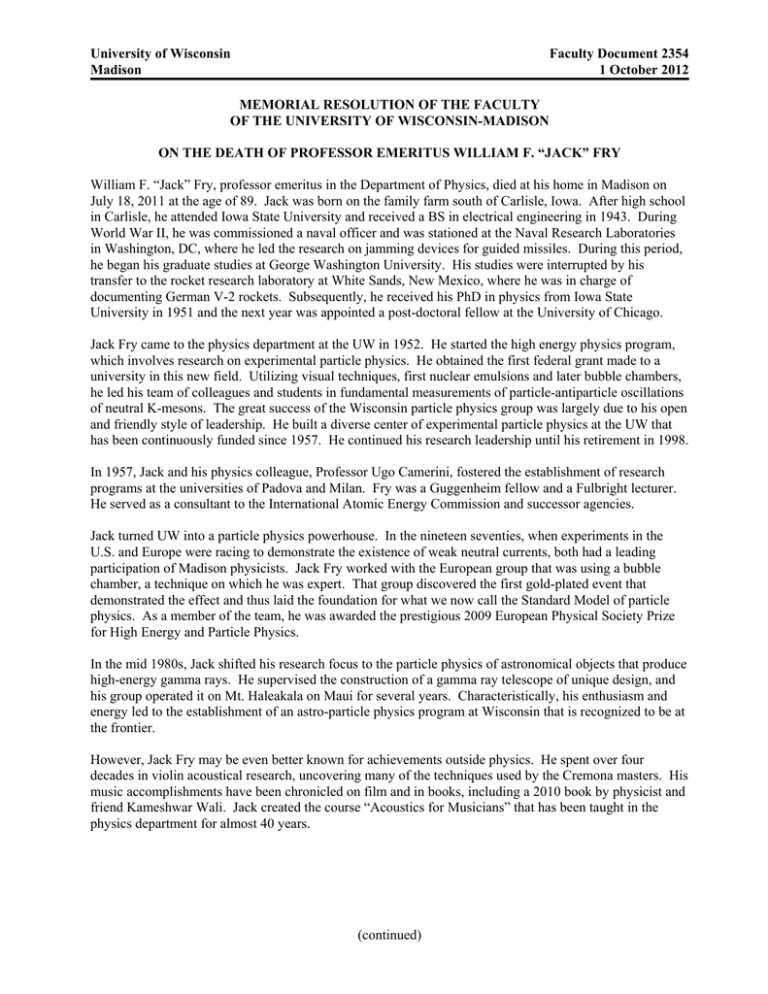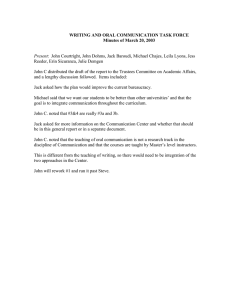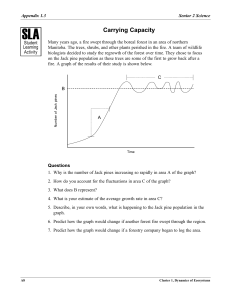University of Wisconsin Faculty Document 2354 Madison 1 October 2012
advertisement

University of Wisconsin Madison Faculty Document 2354 1 October 2012 MEMORIAL RESOLUTION OF THE FACULTY OF THE UNIVERSITY OF WISCONSIN-MADISON ON THE DEATH OF PROFESSOR EMERITUS WILLIAM F. “JACK” FRY William F. “Jack” Fry, professor emeritus in the Department of Physics, died at his home in Madison on July 18, 2011 at the age of 89. Jack was born on the family farm south of Carlisle, Iowa. After high school in Carlisle, he attended Iowa State University and received a BS in electrical engineering in 1943. During World War II, he was commissioned a naval officer and was stationed at the Naval Research Laboratories in Washington, DC, where he led the research on jamming devices for guided missiles. During this period, he began his graduate studies at George Washington University. His studies were interrupted by his transfer to the rocket research laboratory at White Sands, New Mexico, where he was in charge of documenting German V-2 rockets. Subsequently, he received his PhD in physics from Iowa State University in 1951 and the next year was appointed a post-doctoral fellow at the University of Chicago. Jack Fry came to the physics department at the UW in 1952. He started the high energy physics program, which involves research on experimental particle physics. He obtained the first federal grant made to a university in this new field. Utilizing visual techniques, first nuclear emulsions and later bubble chambers, he led his team of colleagues and students in fundamental measurements of particle-antiparticle oscillations of neutral K-mesons. The great success of the Wisconsin particle physics group was largely due to his open and friendly style of leadership. He built a diverse center of experimental particle physics at the UW that has been continuously funded since 1957. He continued his research leadership until his retirement in 1998. In 1957, Jack and his physics colleague, Professor Ugo Camerini, fostered the establishment of research programs at the universities of Padova and Milan. Fry was a Guggenheim fellow and a Fulbright lecturer. He served as a consultant to the International Atomic Energy Commission and successor agencies. Jack turned UW into a particle physics powerhouse. In the nineteen seventies, when experiments in the U.S. and Europe were racing to demonstrate the existence of weak neutral currents, both had a leading participation of Madison physicists. Jack Fry worked with the European group that was using a bubble chamber, a technique on which he was expert. That group discovered the first gold-plated event that demonstrated the effect and thus laid the foundation for what we now call the Standard Model of particle physics. As a member of the team, he was awarded the prestigious 2009 European Physical Society Prize for High Energy and Particle Physics. In the mid 1980s, Jack shifted his research focus to the particle physics of astronomical objects that produce high-energy gamma rays. He supervised the construction of a gamma ray telescope of unique design, and his group operated it on Mt. Haleakala on Maui for several years. Characteristically, his enthusiasm and energy led to the establishment of an astro-particle physics program at Wisconsin that is recognized to be at the frontier. However, Jack Fry may be even better known for achievements outside physics. He spent over four decades in violin acoustical research, uncovering many of the techniques used by the Cremona masters. His music accomplishments have been chronicled on film and in books, including a 2010 book by physicist and friend Kameshwar Wali. Jack created the course “Acoustics for Musicians” that has been taught in the physics department for almost 40 years. (continued) -2­ An avid amateur historian, Jack extensively traveled throughout Europe but most often in Italy. During his travels, he collected, among other items, antique glassware and rare books. Later in his career, he saw an opportunity to collect published and unpublished materials dating from the Fascist period in Italy and also expanded his collecting interests both forward and backward in time. The Fry Collection of Italian History and Culture, his generous gift to the Department of Special Collections in the Memorial Library, occupies nearly 400 linear feet of library shelves, and includes manuscripts and correspondence, broadsides, printed ephemera, periodicals, newspapers, and books from the early Renaissance through the 20th century. The rare and unique materials in the Fry Collection attract researchers both from the United States and abroad. The astonishing range of his interests and accomplishments attests to his passionate curiosity and competence. Jack was modest to a fault and was a generous and supportive mentor and role model to his colleagues. He is survived by his wife, Audrey; two brothers; a daughter; a stepdaughter Catherine Woodward, who is an associate lecturer in the Center for Biological Education; and several other stepchildren. MEMORIAL COMMITTEE Francis Halzen Don Reeder, chair _____________________________________ UW-Madison Fac Doc 2354 - 1 October 2012






